
Maxim Zhuravel, the first Russian doctor in Cote d'Ivoire
/ Главная / Russkiy Mir Foundation / Publications / Maxim Zhuravel, the first Russian doctor in Cote d'IvoireMaxim Zhuravel, the first Russian doctor in Cote d'Ivoire
Svetlana Smetanina
Maxim Zhuravel, a cardiovascular surgeon from Saratov, has built from the ground up the Vascular Disaster Center in Abidjan city. His team includes young Ivorians, graduates of Russian universities. Maxim also heads the Association of Russian citizens in Côte d'Ivoire. Russkiy Mir talked to him about the advantages of Russian medical education and how Russia is viewed in Africa today.
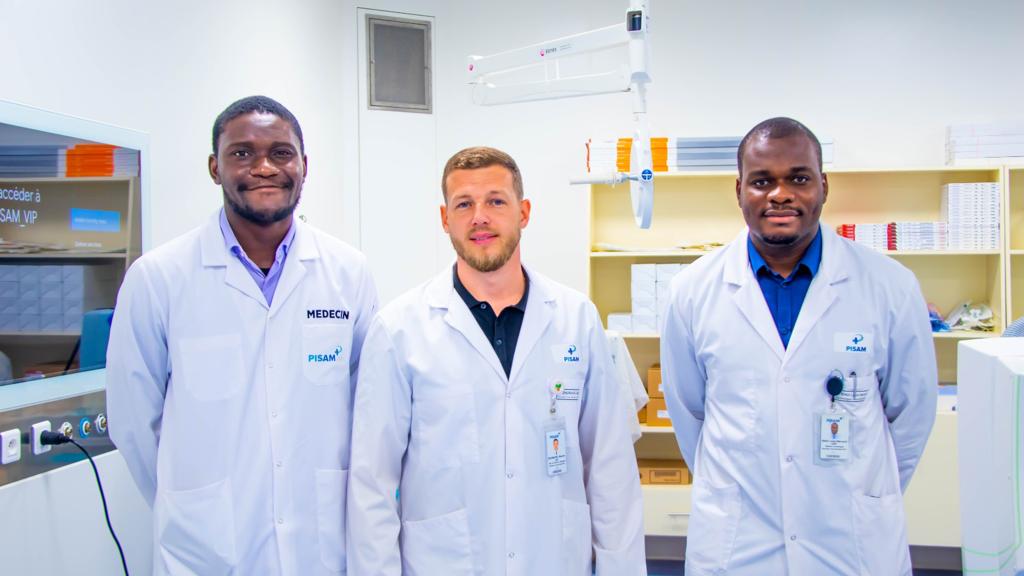
Photo courtesy of M. Zhuravel
- You are a professional doctor. Were you invited to Côte d'Ivoire for a work?In the beginning, I would go for a short time. I would arrive, perform the surgery, and leave. However, I have encountered certain problems, because the postoperative period was out of my control, and it was very difficult to give consultations to the patients and answer their questions over the phone. Afterwards I was offered a long-term contract. Since 2019, I have been working in Abidjan, the capital of Côte d'Ivoire. I am in charge of the Vascular Accident Center.
- Did this medical center already exist when you came there?
- Actually there were no such center. It was my job to set it up from zero. We have launched and fully equipped it. I have partially implemented the equipment from the Russian and European health care systems. Everything has turned out very well.
We provide care for patients with acute heart attack, ischemic stroke, and problems of blood circulation in the lower extremities. It is also my task to train doctors, so I have a team of local specialists, whom I train them so that at the end of my contract they can work independently.
Our staff is consists of people graduated from Russian medical universities. When we have meetings or work in the operating room, we talk exclusively in Russian, it's a part of mine ethical framework, although I know both French and English.
- Are there many specialists in Côte d'Ivoire who have studied in Russia?
- Diplomas of Russian universities are recognized in Côte d'Ivoire, and graduates do not have to go through additional formalities to prove their professional status. The country itself does not have a medical university, it trains only general practitioners. This is why many people go abroad to study medicine. Many of them go to French-speaking countries such as Canada or France. Many also go to Russia, because life and education are cheaper here. However, the quality of medical education in Russia is completely different, our graduates have a broader mind. I can see it very well, the difference is striking. The discipline of the Russian educational system also forces them to learn, despite the fact that they are foreigners and pay for their education.
Guys who studied at Russian universities are different: they are disciplined, responsible, they understand that if they say "I'll do it tomorrow," it's a 100% tomorrow, and maybe it's better to do it today.
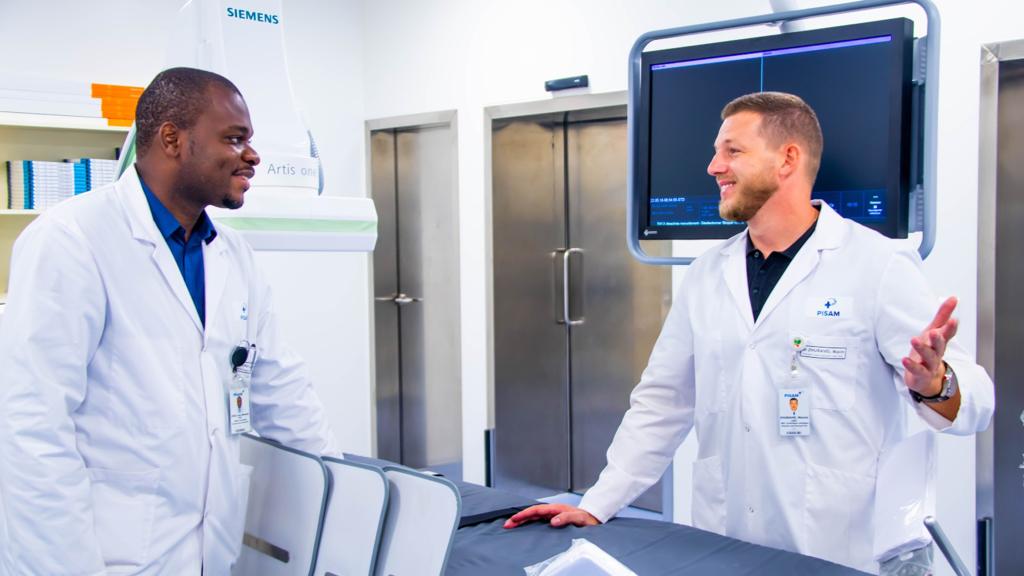
Photo courtesy of M. Zhuravel
- What exactly are the advantages of Russian education?
- The educational system in Russia allows medical students to see patients much earlier than they do in Europe, the United States, or Great Britain. We have more opportunities to volunteer. We have completely different medical summer internships. Most of the students' training takes place on clinical bases, like hospitals, at the patient's bedside. An instructor takes a large group of his students to a hospital room, having previously obtained patients' consent to communicate with the students. And it's all live practice; it's not about the books they read at home.
From the third year we were on duty in the surgical facilities, volunteering, writing case histories at night, for that we were allowed to be in operating rooms. That's where the experience comes from.
No one will mollycoddle you during postgraduate training. You have to be right on the real practice, working with one or two hospital rooms, working with patients night and day. That's how you get tremendous practice every day.
- And how do your patients perceive you? Do they say “I want to see a doctor from Russia?”
- When patients find out that I am not French (Côte d'Ivoire is a former French colony), but Russian, they immediately start smiling. Many come especially for a consultation with a Russian doctor, whom they trust me a priori.
- How many graduates of Russian universities work in your team today? And in general, is Russian education in demand in Cote d'Ivoire?
- There are 12 people working with me. Côte d'Ivoire has a quota of 60 people per year for free education in Russian universities. The rest go for a fee. I think that about a hundred people go to Russia from Côte d'Ivoire every year to study.
In addition to doctors, technical professions such as IT are very popular. They actively go to study for specialists in the agro-industrial sector. There is also demand for professionals in oil industry and pharmacology.
People, educated in Russia, have no problems with locating a job.
- Is the attitude toward Russia generally favorable?
- Very good. I have not yet met a single person who said anything bad about Russia. Everyone admires both Russia and our president. They say, "We wish we had Vladimir Vladimirovich for a month, so he could set everything in order!”
Recently our embassy held an open event dedicated to the Russia Day. Honored guests and diplomats were invited. The entire Foreign Ministry of Cote d'Ivoire was there. I don’t remember any event other at the Russian Embassy with both ministers present at the same time! There were also many diplomats from other African and Arab countries. So everyone here supports Russian policy and everyone understands what's going on in the world today.
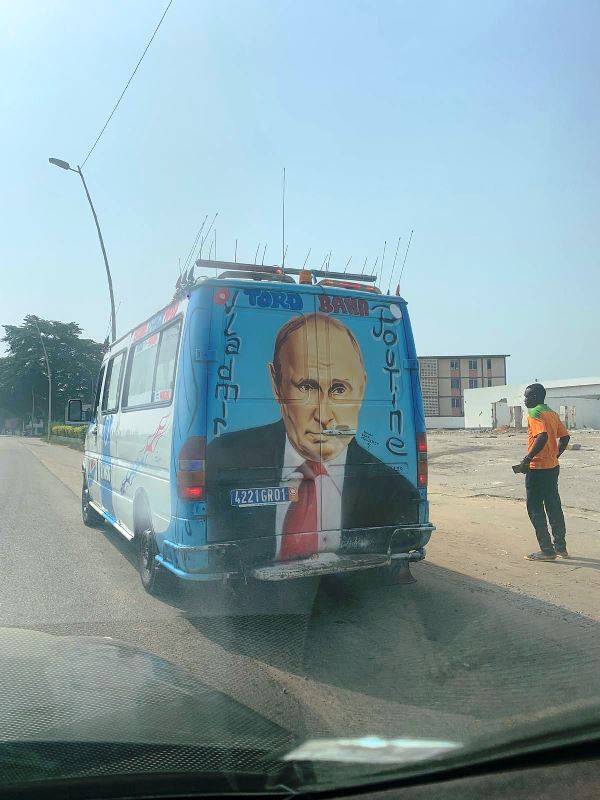
Photo courtesy of M. Zhuravel
- Does Russian influence in Africa become more and more visible?
- When I first came here in 2017, I was very surprised seeing a portrait of Vladimir Putin painted on a local minibus. Local people cannot be penetrated by any Western propaganda, they have their own truth. They would never totally believe the West. But they remember the aid from the Soviet Union to Africa very well.
- You also lead the Association of Russian Citizens in Côte d'Ivoire. What is it about?
- Our association includes mostly women married to Africans who studied in Russia. Most of them work, and their children as a rule are educated in Russia. As for me, I was the first Russian doctor in the history of Côte d'Ivoire to come here to work.
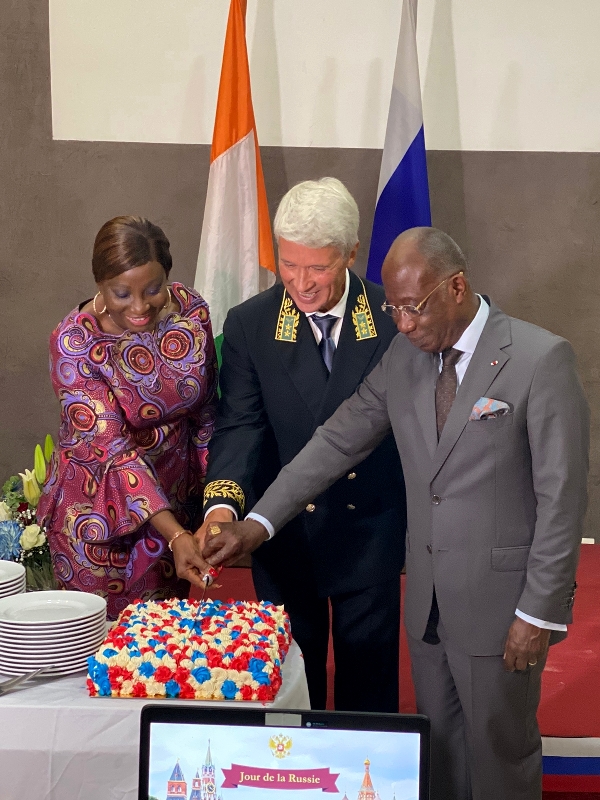
Russia Day in Côte d'Ivoire. In the center is Russian Ambassador Alexei Saltykov
To his right and left are Foreign Ministers of Cote d'Ivoire. Photo courtesy of M. Zhuravel
- Are there opportunities to learn Russian language in the country?
- Yes, by all means. There are online Russian language lessons organized by St. Petersburg University. Also Orenburg University offers Russian language lessons. These are lessons of different formats and for different ages. We also hold various events dedicated to Russian culture. Our embassy helps us with gifts, it brings Russian sweets. We celebrate May 9, we hold our own Immortal Regiment. We invite guests from the local community, listen war songs, talk… We have a lot of heartwarming evenings.
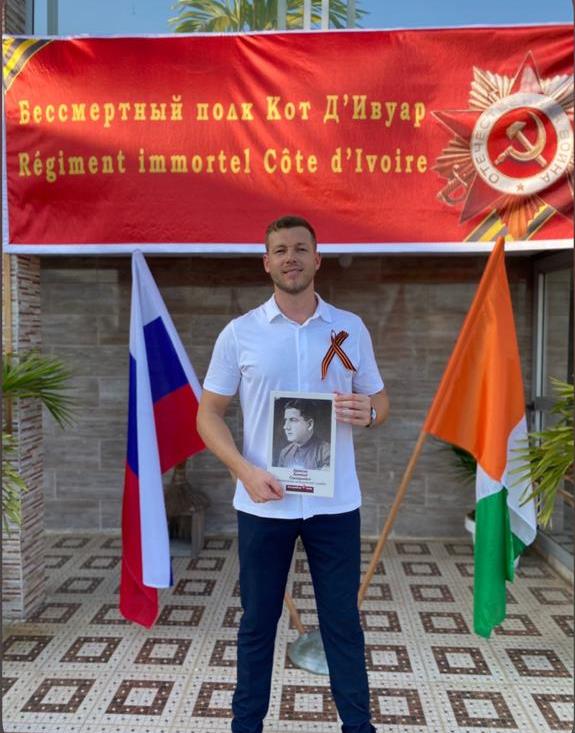
The Immortal Regiment in Cote d'Ivoire. Photo courtesy of M. Zhuravel
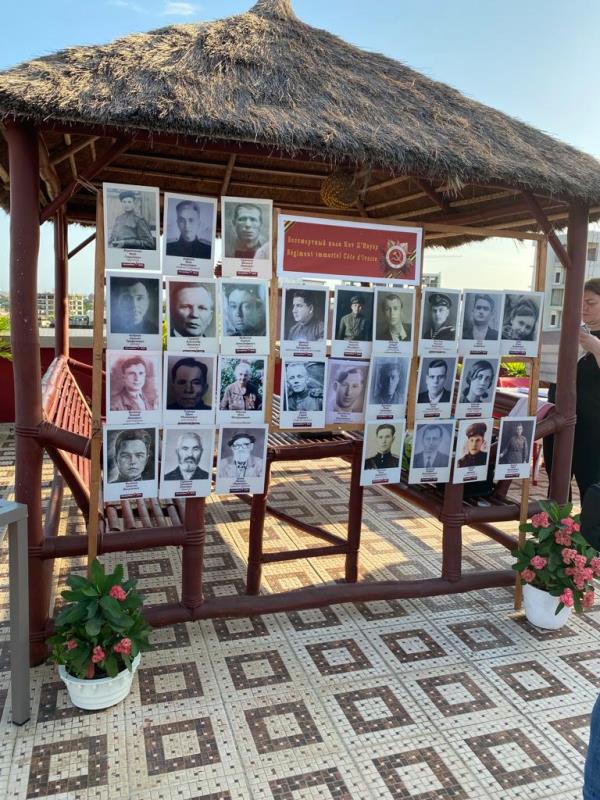
Photo courtesy of M. Zhuravel
New publications

 Mikhail Kalatozov, a director who transformed the world of cinematography in many ways, was born 120 years ago. He was a Soviet film official and a propagandist. Above all, he was capable of producing movies that struck viewers with their power and poetic language.
Mikhail Kalatozov, a director who transformed the world of cinematography in many ways, was born 120 years ago. He was a Soviet film official and a propagandist. Above all, he was capable of producing movies that struck viewers with their power and poetic language.  Ukrainian authorities have launched a persecution campaign against the canonical Ukrainian Orthodox Church (UOC), the biggest one in the country's modern history. Over the past year, state sanctions were imposed on clergy representatives, searches were conducted in churches, clergymen were arrested, criminal cases were initiated, the activity of the UOC was banned in various regions of the country, and monasteries and churches were seized.
Ukrainian authorities have launched a persecution campaign against the canonical Ukrainian Orthodox Church (UOC), the biggest one in the country's modern history. Over the past year, state sanctions were imposed on clergy representatives, searches were conducted in churches, clergymen were arrested, criminal cases were initiated, the activity of the UOC was banned in various regions of the country, and monasteries and churches were seized.  When Nektary Kotlyaroff, a fourth-generation Russian Australian and founder of the Russian Orthodox Choir in Sydney, first visited Russia, the first person he spoke to was a cab driver at the airport. Having heard that Nektariy's ancestors left Russia more than 100 years ago, the driver was astonished, "How come you haven't forgotten the Russian language?" Nektary Kotlyaroff repeated his answer in an interview with the Russkiy Mir. His affinity to the Orthodox Church (many of his ancestors and relatives were priests) and the traditions of a large Russian family brought from Russia helped him to preserve the Russian language.
When Nektary Kotlyaroff, a fourth-generation Russian Australian and founder of the Russian Orthodox Choir in Sydney, first visited Russia, the first person he spoke to was a cab driver at the airport. Having heard that Nektariy's ancestors left Russia more than 100 years ago, the driver was astonished, "How come you haven't forgotten the Russian language?" Nektary Kotlyaroff repeated his answer in an interview with the Russkiy Mir. His affinity to the Orthodox Church (many of his ancestors and relatives were priests) and the traditions of a large Russian family brought from Russia helped him to preserve the Russian language.

 The leaders of the Friends of the Great Russia cultural association (Amici Della Grande Russia) in Italy believe that the Western policy of abolishing Russian culture in Europe has finally failed. Furthermore, it was doomed to failure from the beginning.
The leaders of the Friends of the Great Russia cultural association (Amici Della Grande Russia) in Italy believe that the Western policy of abolishing Russian culture in Europe has finally failed. Furthermore, it was doomed to failure from the beginning.  Name of Vladimir Nemirovich-Danchenko is inscribed in the history of Russian theater along with Konstantin Stanislavski, the other founding father of the Moscow Art Theater. Nevertheless, Mr. Nemirovich-Danchenko was a renowned writer, playwright, and theater teacher even before their famous meeting in the Slavic Bazaar restaurant. Furthermore, it was Mr. Nemirovich-Danchenko who came up with the idea of establishing a new "people's" theater believing that the theater could become a "department of public education."
Name of Vladimir Nemirovich-Danchenko is inscribed in the history of Russian theater along with Konstantin Stanislavski, the other founding father of the Moscow Art Theater. Nevertheless, Mr. Nemirovich-Danchenko was a renowned writer, playwright, and theater teacher even before their famous meeting in the Slavic Bazaar restaurant. Furthermore, it was Mr. Nemirovich-Danchenko who came up with the idea of establishing a new "people's" theater believing that the theater could become a "department of public education."  "Russia is a thing of which the intellect cannot conceive..." by Fyodor Tyutchev are famous among Russians at least. December marks the 220th anniversary of the poet's birth. Yet, he never considered poetry to be his life's mission and was preoccupied with matters of a global scale. Mr.Tyutchev fought his war focusing on relations between Russia and the West, the origins of mutual misunderstanding, and the origins of Russophobia. When you read his works today, it feels as though he saw things coming in a crystal ball...
"Russia is a thing of which the intellect cannot conceive..." by Fyodor Tyutchev are famous among Russians at least. December marks the 220th anniversary of the poet's birth. Yet, he never considered poetry to be his life's mission and was preoccupied with matters of a global scale. Mr.Tyutchev fought his war focusing on relations between Russia and the West, the origins of mutual misunderstanding, and the origins of Russophobia. When you read his works today, it feels as though he saw things coming in a crystal ball...